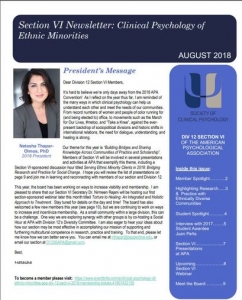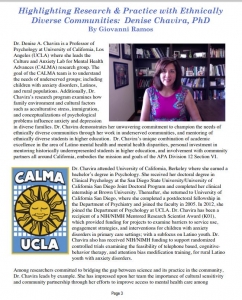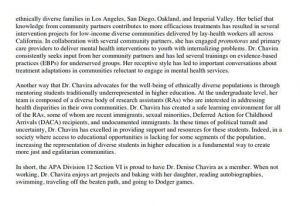CALMA Spotlight of the Week: Gio Ramos- Graduate Student
1. What motivated you to pursue clinical psychology?
It was a combination of personal and professional experiences what made me choose this career. From a personal perspective, coming from Mexico where most people live in poverty definitely influenced my decision. Growing up I witnessed how systemic barriers and chronic stressors contribute to persistent disparities among impoverished families. I just wanted to change that; do something about it! I thought that clinical psychology would provide me with the opportunity to achieve social justice and equality for all families.
After having chosen psychology, I would say that my participation in a community-based program in rural Mexico was another breaking point in my professional development. Working as a community mental health provider made me realize the positive impact that community-based programs can have on the well-being of underserved families. From that moment on, I knew what type of work I wanted to do: Research that addresses the multilevel barriers that prevent Latino families from accessing mental health services.
2. What is your favorite part of research/CALMA?
My favorite thing is definitely the type of work that we do in the CALMA lab. I am fortunate to be part of a lab where we conduct research that has immediate benefits for the community. We are very community-focused and you always feel that your research is making a difference in the lives of underserved Latino families.
3. What advice would you give to undergraduate students hoping to pursue graduate school in clinical psychology?
Since grad school in Clinical Psychology is such a big commitment (it’s very difficult to get into a program and it takes around 4-6 years to complete the degree; the workload and pace are intense; once you obtain your degree you may not score you dream job right off the bat), I recommend that undergraduate students think about what they really want to do with this degree.
Most of the time people tell me that they want to do some type of clinical work–working as a counselor or therapists. Well, in that case you don’t really need a Ph.D in Clinical Psychology! That type of work can be done with a Master’s in Counseling or Social Work. Those are very good degrees and you can finish your studies in 2 years and start working immediately.
Another thing that I often hear from students is that they aren’t sure if they like research. Well, that’s kind of easy to know. Did you like your undergrad research methods or research oriented class? Do you like or at least find it interesting to read research articles? Do you like to write about those articles? If you answer no to any of these questions, you may want to consider other options. Get more research experience as an RA or similar positions and see if you like it. Not liking research is completely fine! That just means that you probably don’t want to get a Ph.D. then since even the most clinically-oriented Ph.D. programs have a strong research component.
In short, you don’t need to be a “doctor” to do super cool work and be happy with what you do!
4. What are some aspirations you hope to accomplish after you complete grad school?
Whatever I do after completing my degree will be related to improving the lives of people in underserved communities. I see different ways that I can do this. For instance, I hope to focus my research on how to improve psychological treatments for Latino families, but more importantly I want to make those interventions available for underserved families through community-based programs.
Another of my goals is to mentor traditionally underrepresented students to achieve advanced degrees. I recognize the importance of having mentors who can support and guide you during your career. This is especially true, when you are a first-generation college student, have scarce financial resources, have to deal with immigration-related issues, or are part of an ethnic minority group. I think that I’m in a privileged position to be a mentor for these types of students because I have faced all these difficulties myself. I really hope to be good a mentor for others throughout grad school and beyond.
5. What is one way that your research/grad school has changed you?
I don’t think that grad school has changed me a lot. It has just reaffirmed my priorities in life. I highly value the type of work that I do, which means that I normally spend extra hours working on my projects. However, I also value my personal life and not academic-related activities. I think grad school is forcing me to try to keep a balance in my life. It’s a work in progress.
In terms of my research, I am more convinced than ever of the importance of conducting research to address mental health disparities present in Latino communities. I hope my own work will help achieve social justice and equality for all families.
Our research Assistants representing CALMA at the 2018 Psychology Undergraduate Research Conference!
In honor of recognizing our CALMA teammates, we want to highlight the research assistants that presented their research at PURC and Undergraduate Research Week last month!
A few of them shared their experiences! See below:
Rosa Hernandez
What is your research about?
My research project aimed to discover whether or not resilience mitigates internalizing symptomatology in rural Latinx adolescents with indirect traumatic exposure–defined as having observed or heard about the trauma of another. Our findings suggest that for youth who experience indirect trauma, resilience may serve as a protective effect against internalizing symptomatology.
What inspired you to research this topic?
Rural populations, due to their geographical location, tend to have less access to mental health resources. Thus, I believe it is important to research the impact that personal characteristics, such as resilience, have on the trajectory of psychological diagnosis to perhaps develop interventions that do not necessarily require seeing a mental health professional on a regular basis.
Hayley Hammons
What is your research about?
My research focused on exploring the effects of pre-treatment expectations on barriers to treatment in the context of an online intervention. We found that participants with low confidence in treatment were more likely to report more barriers to treatment compared to those with neutral or high confidence in treatment. We also found that, on average, participants who did not complete the program reported one more barrier to treatment than those who did complete the program.
What inspired you to research this topic?
I was inspired to study barriers to technology-based interventions because I have always been interested in learning about how online treatments are perceived differently than traditional face-to-face interventions, and whether expectations going into a program can affect treatment outcomes. I was also interested to discover whether online treatments can actually help alleviate barriers to traditional treatment, which has been a huge topic of study since the drastic increase in the use of technology in the 21st century.
Good job ladies! The rest of the CALMA team is very proud of all of you!
Congratulations to Our Graduate Students!
For this month, we want to highlight and congratulate the amazing work our CALMA graduate students are doing!
Gio Ramos is going to be working on the Latino Mental Health Research Training Program, which is a NIH-NIMHD Minority Health and Health Disparities International Research Training (MHIRT) program designed to prepare the very best young researchers to address disparities in mental health care of U.S. Latinos with mental illness. The MHIRT program will afford an invaluable opportunity to continue developing the skills necessary to design multilevel intervention programs that address mental health disparities in Latino communities. Mr. Ramos stated that, “ as part of MHIRT, I will collaborate on a online intervention to reduce stigma and discrimination against mental health patients among health worker.”
Another graduate student, Louise Dixon received the Monica Salinas Summer Research Fellowship and the Graduate Research Mentorship Fellowship. These funding opportunities will help support dissertation research, which is focused on developing health literacy interventions (i.e., fotonovelas) for Latino parents of anxious and depressed youth.
Last, but not least, another graduate student Carolyn Ponting received the NIMH T-32 Predoctoral Training Grant “Bio behavioral Issues in Physical and Mental Health. This grant will allow Ms. Ponting to establish a program of research focused on perinatal mood disorders in underserved women that is methodologically and analytically rigorous (using longitudinal growth models that integrate biopsychosocial risk–infrequently applied to study women of color), multidisciplinary, and translational. Ms. Ponting shared that “given the dearth of perinatal interventions for women with mood disorders, my work under this grant has the potential to improve the quality of interventions available for women of color and to reduce disparities in the mental and physical health of pregnant Latinas and their infants.”
Congratulations to our graduate students on their accomplishments and endless effort to continue to uplift and serve our communities through research!
CALMA Highlight of the Week: Alejandro Chavez, Research Assistant
1. What is your favorite aspect of CALMA?
My favorite aspect of CALMA I would say has more to do with the research lab’s greater, overarching purpose that it proposes itself to achieve rather than something that I do or help with first-hand. The fact that this team dedicates not only to advance research in the mental health field, but that it seeks to aid the greater, general mental health and research disparities that exist. Our ability to connect with rural, underrepresented communities and connect them with resources; our ability to educate, to provide outreach opportunities, and to slowly shift common misconceptions and fears about what is and isn’t, is what I find enriching. That to me is pride-worthy.
2. What inspired your passion to pursue Psychology?
What inspired me to pursue psychology, I’d say has a lot to do with the way I was raised. However, and as our field is notoriously known for, there really isn’t one thing that pushed me to become study and do the work that I do, but rather its a multitude of factors. My family, friends, teachers, my personal growth, my spiritual and religious upbringings, political and human-rights beliefs, difficulties. Life. They all did and I wouldn’t have it any other way.
3. How do you want to best continue your research/ Psych interests in the future?
I see myself, without a shadow of a doubt, as practicing clinical psychologist — not a researcher or a professor. A psychotherapist. I want to help people grow and see themselves in positive ways unimaginable to them. Most importantly, I know that I see myself helping people recover from trauma, suicidality, depression, and abuse. I don’t want to put a label to anything because everything presents itself in so many different ways. These categories themselves are broad and non-binary; they lie on a continuum and thus want to do my best to extend services to anyone who feels that needs help. I do know, however, that life and reality will make that difficult — educational expenses, making a living for myself — but I will do my best to try and accommodate to anyone who needs my services to the best of abilities depending on the varying barriers that may present themselves at given points in time.
4. Why do you think a focus on mental health and culture is important?
I like to think that a focus on mental health and culture is important because they very much go hand-in-hand. I, for one, when I think of the two tend to focus on the negatives —- stress and its consequential role on the mind and body; the constant pressure to conform, adapt and tackle challenges and milestones as they present themselves. You name it, they are all very much connected and thus, incredibly important to study, promote awareness, and push for new policy. I think that we live in a time of desperate need for reformation given our world’s current state of awareness, education, media and connection. We’re aware of these things and it is thus our responsibility to do something about it. I could really go on and on about this because it fascinates me. I just find it baffling that we take these concerns for granted often thinking that its just the result of living in a “competitive” world, almost as if we’re constantly throwing subtle Darwinian shade at one another because we feel the need to be more than the other, or simply the need to make a living nowadays. The competition is so blatant and its only going to continue to increase. … I’m not sure if you can see where I am going with this (haha). Really though, there is so much to talk about and research. We just have to think outside the box a bit. It truly is fascinating.
5. If you had to describe yourself as a food what would it be and why?
That is perhaps the most odd question I have ever seen that I really don’t know how to respond to that (ha). Uhh .. Fettuccine Alfredo because .. I… love it? I don’t know. Oh! and side note: Did you know that Fettuccine Alfredo isn’t even authentically Italian? Like what?! I’m still in shock (lol). I really do love Fettuccine Alfredo though, not going to lie.



